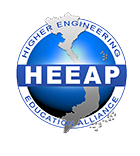CAN THO, March 19, 2013 -- The U.S.-supported Higher Engineering Education Alliance Program (HEEAP) opened its first conference to provide leaders in government, industry and academia an opportunity to discuss and collaborate on improving engineering education throughout Southeast Asia.
Hosted at Can Tho University, the two-day Vietnam Engineering Education Conference focuses on ways to build sustainable higher education systems, methods to assess performance of engineering education programs and innovation instructional methods. The event features a "Technology Avenue," with exhibits on advanced engineering simulations software, engineering design tools, learning management systems and student robotics labs.
"HEEAP advances engineering undergraduate learning and instruction through an innovative faculty development program," said An T. Le, Consulate General of the United States in Ho Chi Minh City. He noted that women play an important role in the science and technology and economic development. "We are proud that HEEAP works to boost women's participation in engineering."
Other conference participants include William Colglazier, the Science and Technology Advisor to the United States Secretary of State and leaders from HEEAP alliance partners: Joakim Parker, Mission Director of United States Agency for International Development (USAID), Sherry Borger, General Manager of Intel Products Vietnam, Linda Rae, President of Keithley Instruments, Tektronix ASEAN, and rectors from eight universities and vocational colleges in Vietnam.
HEEAP was established in 2010 through a partnership of USAID, Intel Corporation and Arizona State University's Ira A. Fulton Schools of Engineering. A total of 122 lecturers were trained under HEEAP from 2010 to 2012 and are working on innovation projects to transform engineering education. The expansion of HEEAP is from 2013 to 2017 with an estimated investment of $40 million. They focus on leadership development, faculty development, curriculum, lab and infrastructure, distance education, diversity and instructional expert development, and English.
The goal is to graduate work-ready students to provide a highly trained workforce in Vietnam to meet the growing needs of global high-tech industries. Ultimately, HEEAP intends to strengthen education and research collaborations and business partnerships between Vietnam and other countries, including the United States.
HEEAP is planning to make the conference an annual event.
Story and photo by USAID. View this article on USAID's website.
Photo Caption: USAID Mission Director Joakim Parker speaks at the Vietnam Engineering Education Conference.

